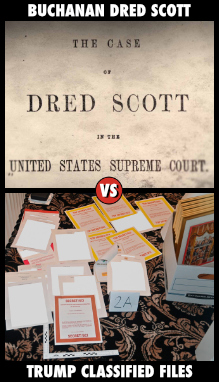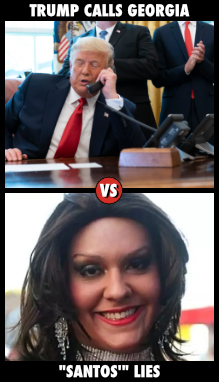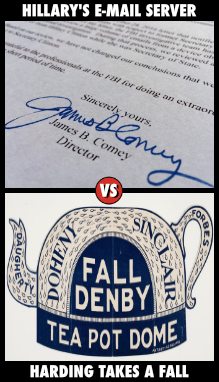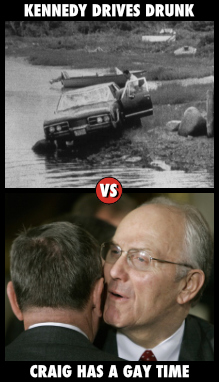

Aaaaaaaand we're back. Let's jump right into the reveal of the second portion of the Venality quadrant:
VENALITY ROUND 1, PART II MATCHUPS

#6 James Buchanan pulls SCOTUS strings prior to Dred Scott decision (Early 1857): James Buchanan was both very arrogant and very stupid. This, as readers may have noticed, is a dangerous combination for a president.
In any event, with five Southerners on the Supreme Court, Dred Scott was going to lose his case regardless of Buchanan's involvement. Nonetheless, the then-president-elect saw himself as a latter-day George Washington, and could imagine himself being lionized as "savior of the Union." So, he put his thumb on the scales. Specifically, he had extensive conversations with Associate Justice Robert Cooper Grier, as both men knew each other well from their time in Pennsylvania politics. Grier kept Buchanan informed as to the Court's deliberations; Buchanan encouraged Grier to vote with the majority (so the ruling would not appear sectional) and also used Grier to lean on the Court for a ruling that would "permanently" settle the slavery issue.
Needless to say, it did not work out as Buchanan planned. The Court's decision, which not only decreed that as a Black man, Scott had no right to sue, but also that Congress had no right to place limits on slavery, most certainly did not "settle" the slavery issue. What it did do was utterly ruin the credibility of the Court, and also of Buchanan, in one fell swoop. The day the Dred Scott decision was announced was very probably the day that the Civil War became inevitable.
We are fortunate today to live in a time when a Supreme Court justice would never share their deliberations with outsiders, and would certainly not allow their decisions to be influenced by personal political considerations. Progress!
#11 Donald Trump decides to keep his classified documents collection (May 2022): We may know one day why the former president decided to take a collection of classified documents home with him when he left the White House. But we don't know yet, and so we can't know exactly when he made this particular choice. What we do know is that in May 2022, he knew that NARA and the DoJ were on to him, and he decided to defy them rather to come clean.
This is one of those blunders—and there are several of them in the competition, as we've noted—where nobody knows how the story ends. But when Trump chose to give the finger to the feds, he passed the point of no return. He could have claimed ignorance, and people definitely would have believed it. And even if they didn't believe it, there wouldn't have been enough there to prosecute. But by trying to hold on to the documents, he clearly crossed a line (one that Mike Pence and Joe Biden, fellow document-keepers who alerted the government as soon as they became aware of their mistakes, did not). And it could very well end up costing Trump big-time.

#3 Donald Trump Calls Georgia officials to demand they find more votes for him (Jan. 2, 2021): As with the previous blunder, this is a story that is still being written. Truth be told, we don't know why the seeding committee put this one so high on the list and the classified documents so much lower. In both cases, the former president appears to be caught red-handed. In both cases, he could face prison time. In both cases, he did something incredibly careless and incredibly stupid, and there's plenty of hard evidence to prove it.
Just in case you've forgotten the details of the call between Trump and Georgia Secretary of State Brad Raffensperger (R), the then-president was recorded demanding that the Secretary "find, uh, 11,780 votes," which would have flipped Georgia to Trump by one vote. The reason that Trump was recorded was because he had made calls like this prior to this date, including to Raffensperger. So, Raffensperger was just covering his rear end (with two other colleagues listening in on the call, just in case).
In contrast to the classified documents, this blunder by Trump has already has at least one clear set of consequences. Because the Donald was angry with Raffensperger and with Gov. Brian Kemp (R-GA), he threw a temper tantrum and announced that there was no point in voting in the runoff elections in Jan. 2021, since everything was rigged anyhow. Did this cause some Trumpers to stay home? Probably. Did that allow for the elections of Sens. Jon Ossoff and/or Raphael Warnock (both D-GA)? It's very possible.
#14 "George Santos" lies about, well, everything (1988?-Present): Rep. "George Santos" (R-NY) has been lying about anything and everything for so long that there's really no way to know when it all began. He was born in 1988 (probably?), so we'll just have to assume the starting point came sometime around then. Well, unless he found a way to tell lies in the womb.
In any case, everyone reading this knows two things: (1) "Santos" has told all sorts of whoppers, and (2) there is absolutely no chance he makes it past this round, given what he's up against.

#7 Hillary Clinton decides to use a private e-mail server (January 2009): It is absolutely true that Clinton's two immediate predecessors as secretary of state, namely Condoleezza Rice and Colin Powell, used private e-mail servers because the government-provided service was godawful. However, Clinton also knew this was against the rules, and that she was under a much bigger microscope than any Cabinet member in history.
We all know what happened, of course. The existence of the e-mail server was discovered, and Republicans treated that as a scandal on the order of Watergate, Teapot Dome, and Iran-Contra combined and multiplied by ten. The amount of harm done to national security was negligible, especially given that the bad guys apparently didn't know about the server. But that didn't stop House Republicans from launching a dozen investigations.
In the end, the e-mail server did not particularly affect Clinton's service in the State Department, or the Obama presidency. But it became a giant millstone around her neck when she ran for president in 2016. Maybe, in the absence of the server, Republicans would have successfully created another millstone, like Benghazi or Uranium One. But the red team actually tried those, early and often, and they didn't stick the way that Clinton's e-mails did. Also, those other "scandals" did not produce an October surprise, but the e-mails certainly did, very probably leading to the election of Donald Trump.
#10 Warren Harding appoints Albert Fall Secretary of the Interior (March 5, 1921): Harding was not the sharpest knife in the presidential drawer, but he knew enough to observe, "I have no trouble with my enemies. I can take care of my enemies in a fight. But my friends, my goddamned friends, they're the ones who keep me walking the floor at nights!"
Harding might well have been speaking of Fall, who was certainly a friend, and was a well-known shady character. He won more than one election in a manner that was not necessarily legal, and he was certainly on the take for much of his Washington career. Harding should have known full well not to trust Fall with... well, anything, but instead Fall was given the Interior Department.
On assuming the secretaryship, Fall immediately got to work lining his pockets. He managed to get responsibility for vast, valuable federal government oil reserves transferred from the Navy Department to the Interior Department. Then Fall awarded no-bid contracts to two oil-baron buddies, Harry Sinclair and Edward Doheny. Sizable bribes were paid to the Secretary in exchange for this consideration (at least $400,000, which would be about $7 million today). Fall was careless about showing off his newfound wealth and he ended up on trial, convicted, and imprisoned. It's not clear if Harding knew about the shady business, as he died before the scandal broke, but he really should have known.

#2 Ted Kennedy drives drunk in Chappaquiddick (July 18, 1969):
We spent much time debating the inclusion of this one as, once again, we don't want to make light of people's deaths. However, we ultimately decided to include this one because it was very consequential, and the death of Mary Jo Kopechne was inadvertent, not willful (in contrast to, say, the deaths that result from invading a foreign country).
The Kennedys were well known for their hedonistic ways, consuming ample alcohol (and sometimes drugs), cheating on their wives, sexually harassing female staffers and just generally behaving in a manner that did not bring honor to either their family or their gender. After Robert F. Kennedy was assassinated in 1968, his family got into the habit of hosting reunions of his campaign staffers at Chappaquiddick Island, off the coast of Martha's Vineyard. At the fourth such reunion, RFK's brother Teddy was in attendance, as was Kopechne. The two of them left the party at 11:15 p.m. on July 18; both had been drinking rather heavily.
Exactly what happened thereafter will never be completely clear. Kennedy drove his vehicle off a bridge; it flipped over and settled on the bottom of a body of water called Poucha Pond. Exactly when the accident took place, when Kopechne succumbed, and whether Kennedy made any effort to help her remain matters of dispute. In any event, he survived, she didn't, and he didn't even report the accident until the next day.
In the short term, the incident caused a relatively minor scandal, while Kennedy got a slap on the wrist. But the story lingered, and was the subject of at least 15 books. This effectively ended Teddy's presidential hopes, and made certain that he would never rise higher than U.S. Senator.
#15 Larry Craig visits a men's bathroom at the airport (June 11, 2007): Recall that we tried to limit the number of sex scandals that made the bracket, choosing a few representative specimens. Craig is here as the avatar for the "do as I say, not as I do" crowd, as countless politicians have publicly blasted various types of sexual behavior (particularly homosexuality) while privately partaking of the same behavior.
Craig, for his part, represented Idaho in the U.S. House of Representatives for five terms, and then in the U.S. Senate for another three, making for a Washington career that spanned nearly three decades. During that time, he played the role of puritanical Republican to a T, blasting Bill Clinton's affair with Monica Lewinsky and pushing for harsh punishment for then-Rep. Barney Frank (D-MA) for engaging the services of a gay prostitute. Craig also voted against same-sex marriage, against extending benefits to same-sex couples, and against making violence perpetrated upon LGBTQ people a hate crime. The LGBT advocacy group Human Rights Campaign gave Craig a rating of "zero."
Turns out Craig was living in a glass house while he was throwing all those stones. As early as 1982, during his first term in the House, there were rumors of male pages in the House being propositioned by the Representative. He did not get caught red handed (or, feel free to substitute your choice of color and body part) until 25 years later, while visiting a Minneapolis airport bathroom known for cottaging. Craig used his feet and his hands to express interest in the gentleman occupying the bathroom stall next to his. Unfortunately for him, that gentleman was an undercover cop. The resulting criminal charges and court case marked the end of Craig's political career.
We have now completed the second of the four brackets; here's how it looks prior to any matchups being resolved:

The ballot for this round is here. If you have comments on any or all of these matchups, and why you voted as you did, please send them here. (Z)